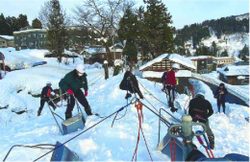Old & New video

People enjoy a sauna built in the second Sabus, a city bus converted into a mobile sauna, in Takasaki, Gunma Prefecture, on Sept. 16. Inside the sauna, a hanging strap and a stop button have been repurposed.
10:11 JST, October 11, 2024
Unused buses, renovated and reborn as mobile wood-fired saunas, are being rented out to hot spring facilities, campsites, event venues and other places across the country. The buses are called Sabus, or sauna buses.
Originally, there was only one Sabus, and it was based in Himeji, Hyogo Prefecture. However, since this summer’s completion of the second Sabus, which is based in Kawasaki, there are more opportunities to see the mobile sauna in eastern Japan.

A cold-water bath prepared by Iwasaki Kogyo Co. near the second Sabus
On Sept. 16, the second Sabus went to a levee construction site on the banks of Karasugawa river in Takasaki, Gunma Prefecture, as a gift to construction site tour participants.
The event was run to help inform nearby residents about the details of the construction and express appreciation to them. Iwasaki Kogyo Co. in Ota, Gunma Prefecture, which is managing the construction project, organized the free event.

Self-guided tours were held in the construction site on the banks of the Karasugawa river. The Sabus and heavy construction machines were displayed for public viewing.
The second Sabus was an unused Tokyu bus. The outer appearance of the vehicle is almost identical to a city bus. The vehicle had reportedly traveled on an expressway from Kawasaki the day before the event.
Inside the vehicle, there is a U-shaped sauna with seats in the back. This layout allows strangers to easily start conversations across the central table. Users can also look out through the large windows near the seats.

Users come in and out of the Sabus’ sauna room.
Parts that remind people of the bus’ former functions have been repurposed for the interior. The stop button was turned into a switch used to pour water on heated stones. The ticket box is now a container for the water and a handle on a hanging strap has been repurposed as a thermometer’s outer frame.
“When I found out about the first sauna bus, I really wanted to try it. But there were not many opportunities for that in eastern Japan. When I learned a few weeks ago that the second sauna bus would finally come here, I immediately made a reservation. I really looked forward to today. I am satisfied that I could experience this unique sauna,” a female company employee in her 30s who visited from Kumagaya, Saitama Prefecture, said excitedly.

A ticket box contains water to be poured on sauna stones.
Sabus is the brainchild of Arisa Matsubara, 31, an employee of Shinkibus Co. based in Himeji, Hyogo Prefecture. Matsubara came up with the idea around the summer of 2020, when she was looking for new ways to use buses amid the decline in the number of bus passengers due to the COVID-19 pandemic. She used examples in Finland and other countries as reference. The Sabus service is operated by the Osaka-based company Rebirth that Matsubara founded during a temporary work transfer in 2021. Sauna Ikitai, a sauna search website operating company, has assisted in supervising projects and design work. The first Sabus was completed in February 2022, but they could not meet countrywide demand with only one mobile sauna.

A sauna ticket reads “Joshaken,” which sounds like “bus ticket” in Japanese, but the actual kanji means “steam vehicle ticket.” Participants in the construction site tour event could use the sauna free of charge.
“I will be glad if people find both the sauna and the bus itself to be appealing. I would like to continue to look for new ways to repurpose unused buses in the future,” Matsubara said.
While it depends on the organizer, a usage fee is often required for sauna access.
Top Articles in JN Specialities
-

Tokyo University of the Arts Now Offering Free Guided Tour of New Storage Building, Completed in 2024
-

Exhibition Shows Keene’s Interactions with Showa-Era Writers in Tokyo, Features Newspaper Columns, Related Materials
-

The Japan News / Weekly Edition (1/30-2/5)
-

Step Back in Time at Historical Estate Renovated into a Commercial Complex in Tokyo
-

Prevent Accidents When Removing Snow from Roofs; Always Use Proper Gear and Follow Safety Precautions
JN ACCESS RANKING
-

Japan PM Takaichi’s Cabinet Resigns en Masse
-

Japan Institute to Use Domestic Commercial Optical Lattice Clock to Set Japan Standard Time
-

Israeli Ambassador to Japan Speaks about Japan’s Role in the Reconstruction of Gaza
-

Man Infected with Measles Reportedly Dined at Restaurant in Tokyo Station
-

Videos Plagiarized, Reposted with False Subtitles Claiming ‘Ryukyu Belongs to China’; Anti-China False Information Also Posted in Japan




















